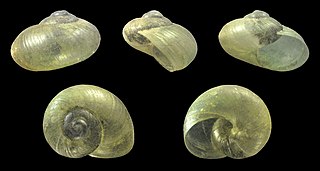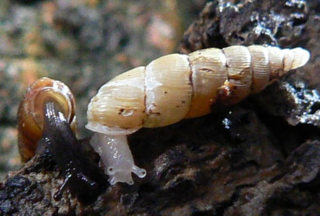
Eduard von Martens also known as Carl or Karl Eduard von Martens, was a German zoologist.

Caucasotachea vindobonensis is a large species of air-breathing land snail, a terrestrial pulmonate gastropod in the family Helicidae.

Lithoglyphus naticoides, the gravel snail, is a species of small or minute freshwater snail with an operculum, an aquatic gastropod mollusk in the family Lithoglyphidae.

Theodoxus danubialis is a species of small freshwater snail with an operculum, an aquatic gastropod mollusk in the family Neritidae, the nerites. The species is considered as endangered in Germany, Austria and in the Czech Republic.
The striped nerite, scientific name Theodoxus transversalis, is a species of small freshwater snail with an operculum, an aquatic gastropod mollusk in the family Neritidae, the nerites.

Ludwig Karl Georg Pfeiffer, also known as Louis Pfeiffer, was a German physician, botanist and conchologist.

Macrogastra plicatula is a species of air-breathing land snail, a terrestrial pulmonate gastropod mollusk in the family Clausiliidae, the door snails.

Stagnicola fuscus is a species of freshwater snail, an aquatic gastropod mollusk in the family Lymnaeidae, the pond snails.

Urticicola umbrosus is a species of air-breathing land snail, a terrestrial pulmonate gastropod mollusk in the family Hygromiidae, the hairy snails and their allies.

Vitrina pellucida is species of small land snail, a terrestrial pulmonate gastropod mollusk in the family Vitrinidae, the glass snails.

Trochulus striolatus, previously known as Trichia striolata, common name the "strawberry snail," is a species of small, air-breathing land snail, a terrestrial pulmonate gastropod mollusk in the family Hygromiidae.

Pseudofusulus varians is a species of air-breathing land snail, a terrestrial pulmonate gastropod mollusk in the family Clausiliidae.

Macrogastra badia is a species of air-breathing land snail, a terrestrial pulmonate gastropod mollusk in the family Clausiliidae.

Wilhelm Dunker, full name Wilhelm Bernhard Rudolph Hadrian Dunker was a German geologist, paleontologist and zoologist.

Julius Wilhelm Albert Wigand, known as Albert Wigand, was a German botanist, pharmacologist and pharmacognostician. His is most well known for being the director of the Alter Botanischer Garten Marburg from 1861 to 1886, and for his opposition to Charles Darwin and the theory of Evolution on religious grounds.

Theodoxus prevostianus is a species of small freshwater snail with an operculum, an aquatic gastropod mollusk in the family Neritidae, the nerites.

Johann Jakob Pfeiffer was a German evangelical theologian, as well as a professor, and later, dean, at the University of Marburg.

Burkhard Wilhelm Pfeiffer was a German jurist and liberal politician. He is best remembered to students of German legal history as the author of Praktische Ausführungen aus allen Teilen der Rechtswissenschaften, Mit Erkenntnissen des Oberappellationsgerichts zu Kassel or "Practical Explanations from all Parts of Jurisprudence, with Findings of the High Court of Appeal in Kassel," and for his years-long rivalry with the Hessian prime minister Ludwig Hassenpflug.

Franz Georg Pfeiffer was a German legal scholar and politician.

Karl Ludwig Pfeiffer was a German malacologist, banker, and patron of the arts.



















